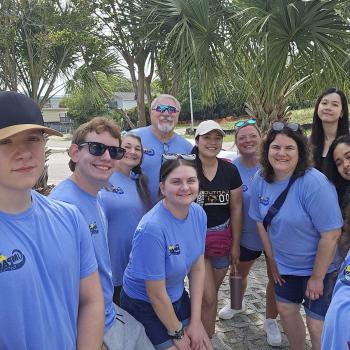 By Kate Dugan and Jennifer Owens
By Kate Dugan and Jennifer Owens
Last summer, Liturgical Press released From the Pews in the Back: Young Women & Catholicism -- a collection of essays and memoirs by women in their 20s and early 30s about being Catholic today. As the two editors of this collection, we have traveled to several places around the country talking about some of the ideas and issues that these women address.  Our audiences tend to be other Catholics, often other young Catholics, often Catholics of an older generation. One of the recurring questions that we have been asked is what we think the future of the Church looks like, how we expect this generation of young people, especially women, to affect (or not affect) Catholicism.
Our audiences tend to be other Catholics, often other young Catholics, often Catholics of an older generation. One of the recurring questions that we have been asked is what we think the future of the Church looks like, how we expect this generation of young people, especially women, to affect (or not affect) Catholicism.
It is always awkward to try to suss out the future, to take a few stabs at what might be based on what we know now. Our effort to do so here stems from some of the contemporary sociological research on young adult Catholics, on our experiences as young Catholic women, and the process of putting together From the Pews in the Back.
First of all, one of the recurring themes in contemporary research is the idea from Dean Hoge's Young Adult Catholics: Religion in the Culture of Choice. He and his co-researchers suggest that one of the formative identity characteristics among young Catholics is "Catholic glue." Many of the young Catholics in their study either don't attend Mass as often as older Catholics and/or don't profess allegiance to parts of Catholic teaching. Yet a stunning majority of them continue to call themselves Catholic and don't anticipate changing their religious affiliation. The Hoge team attributes much of this Catholic glue to the fact that many of these young Catholics grew up Catholic and can't really imagine having another religion. A similar conflicting identity claim exists in From the Pews in the Back, as well; one author describes the tension as "passionate ambivalence" about being Catholic.
In the next few decades of Catholicism, tracking the pull of this Catholic glue will become increasingly interesting. As this generation of Catholics begins (and continues) to have children, we are making decisions about how to raise our children, whether or not to baptize them, what kind of Catholicism (if any) to teach them at home. Young Catholics today have a much more fluid understanding of what it means to be Catholic than previous generations, and this fluidity will undoubtedly affect the kind of Catholic glue we pass on to the next generation of Catholics.
Secondly, the future of young people in Catholicism will be affected by the way local churches respond to their younger populations. Anecdotes from our own lives and from the women in From the Pews in the Back suggest that there is a fair amount of bemoaning the status of young people in parishes. Older Catholics wonder why young Catholics aren't participating in the life of parishes, why they aren't joining, why they don't see them at Mass. Younger Catholics slip into the back pews and wonder why parishes don't seem to have the same vivacity as Masses on their Catholic campus. Single Catholics wonder where they fit in among the families and the retirees.
The question here seems to be whether parishes will keep complaining or make adjustments to more effectively reach out to their (potential) younger members. Research is starting to suggest that offering Sunday evening Mass is an important way to involve young Catholics. A promising aspect of parish life in some parts of the country is young adult ministry. Programs like Theology on Tap, which bring in speakers on particular topics associated with Catholic life and allow for questions and discussion of those topics, are important. Not only are they a part of ongoing catechesis, but they also allow young adults to voice their questions and concerns in a constructive way.
Service work and opportunities for interfaith dialogue also offer young adult Catholics ways to connect with parish life. It is also important for existing parish ministries to be intentionally intergenerational -- to create opportunities not only for young adults to learn from more experienced parishioners, but also to encourage members of older generations to share a spirit of openness and hospitality to the contributions of young adult Catholics. How and why parishes respond to the needs of young adult Catholics will be an important key to the future of Catholicism in the U.S.




